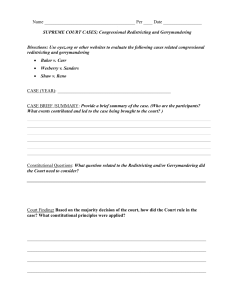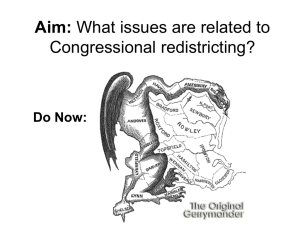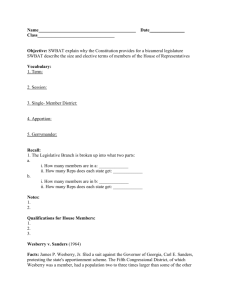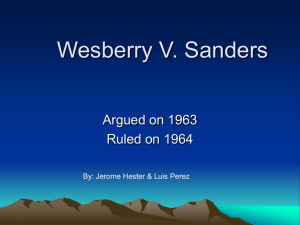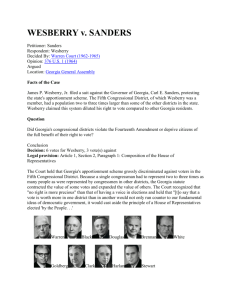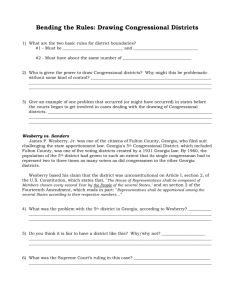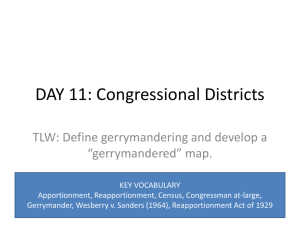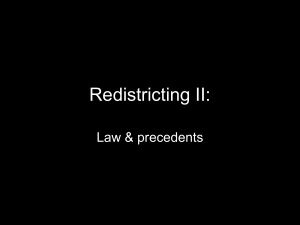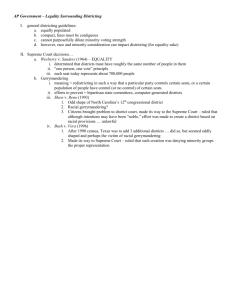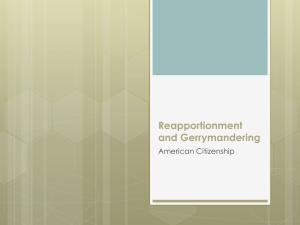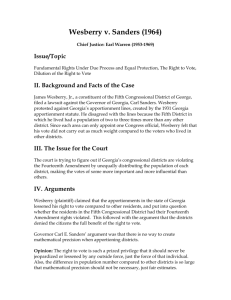Ch. 10 Gerrymandering Assignment
advertisement
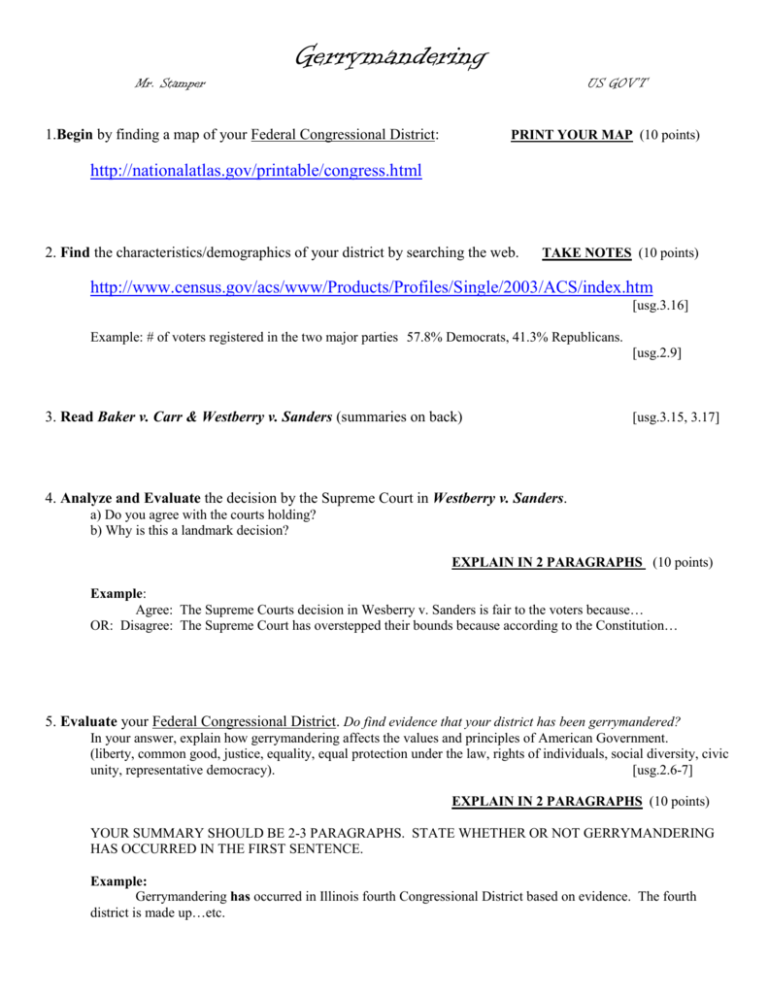
Mr. Stamper Gerrymandering 1.Begin by finding a map of your Federal Congressional District: US GOV’T PRINT YOUR MAP (10 points) http://nationalatlas.gov/printable/congress.html 2. Find the characteristics/demographics of your district by searching the web. TAKE NOTES (10 points) http://www.census.gov/acs/www/Products/Profiles/Single/2003/ACS/index.htm [usg.3.16] Example: # of voters registered in the two major parties 57.8% Democrats, 41.3% Republicans. [usg.2.9] 3. Read Baker v. Carr & Westberry v. Sanders (summaries on back) [usg.3.15, 3.17] 4. Analyze and Evaluate the decision by the Supreme Court in Westberry v. Sanders. a) Do you agree with the courts holding? b) Why is this a landmark decision? EXPLAIN IN 2 PARAGRAPHS (10 points) Example: Agree: The Supreme Courts decision in Wesberry v. Sanders is fair to the voters because… OR: Disagree: The Supreme Court has overstepped their bounds because according to the Constitution… 5. Evaluate your Federal Congressional District. Do find evidence that your district has been gerrymandered? In your answer, explain how gerrymandering affects the values and principles of American Government. (liberty, common good, justice, equality, equal protection under the law, rights of individuals, social diversity, civic unity, representative democracy). [usg.2.6-7] EXPLAIN IN 2 PARAGRAPHS (10 points) YOUR SUMMARY SHOULD BE 2-3 PARAGRAPHS. STATE WHETHER OR NOT GERRYMANDERING HAS OCCURRED IN THE FIRST SENTENCE. Example: Gerrymandering has occurred in Illinois fourth Congressional District based on evidence. The fourth district is made up…etc. Baker v. Carr, 369 U.S. 186 (1962) The decision of Baker v. Carr was one of the most wrenching in the Court's history. Plaintiff Baker was a Republican who lived in Shelby County, Tennessee, the county in which Memphis is located. His complaint was that though the Tennessee State Constitution required that legislative districts be redrawn every ten years according to the federal census to provide for districts of substantially equal population, Tennessee had not in fact redistricted since the census of 1900. By the time of Baker's lawsuit, his district in Shelby County had about ten times as many residents as some of the rural districts. His argument was that this discrepancy was causing him to fail to receive the "equal protection under the laws" required by the Fourteenth Amendment. Defendant Joe Carr was sued in his position as Secretary of State for Tennessee. Carr was not the person who set the district lines – the state legislature had done that – but was sued ex officio as the person who was ultimately responsible for the conduct of elections in the state and for the publication of district maps. The State of Tennessee argued that legislative districts were essentially political, not judicial, questions, as had been held by a plurality opinion of the Court in Colegrove v. Green (1946), wherein Justice Felix Frankfurter declared that, "Courts ought not to enter this political thicket." Frankfurter believed that relief for legislative malapportionment had to be attained through the political process. The opinion was finally handed down in March 1962, nearly a year after it was initially argued. The Court split 6 to 2 in ruling that Baker's case was justiciable (appropriate for the courts to decide), producing, in addition to the opinion of the Court by Justice William J. Brennan, three concurring opinions and two dissenting opinions. Brennan reformulated the political question doctrine, proposing a six-part test for determining which questions were "political" in nature. Wesberry v. Sanders, 376 U.S. 1 (1964) Westberry v. Sanders was a case involving congressional districts in the state of Georgia, brought before the Supreme Court of the United States. The Court issued a ruling on February 17, 1964 that districts have to be approximately equal in population. House districts and of rural overrepresentation in the chamber came to an end in the mid- to late 1960s. These abrupt changes were the direct result of a historic decision by the Supreme Court in 1964. In Wesberry v. Sanders, the Court held that the population differences among Georgia's congressional districts were so great as to violate the Constitution. In reaching its landmark decision, the Supreme Court noted that Article I, Section 2 of the United States Constitution declares that representatives shall be chosen "by the People of the several States" and shall be "apportioned among the several States...according to their respective Numbers...." These words, the Court held, mean that "as nearly as practicable one man's vote in a congressional election is to be worth as much as another's." The importance of Wesberry and the Court's later "one person, one vote" decisions cannot be overstated. They had an extraordinary impact on the makeup of the House, on the content of public policy, and on electoral politics in general. The nation's cities and suburbs now speak with a much larger voice in Congress than ever before. Notice, however, that it is quite possible to draw congressional (or any other) district lines in accord with the "one person, one vote" rule and, at the same time, to gerrymander them.
